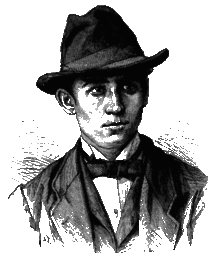Max Hödel
Emil Max Hödel | |
|---|---|
 | |
| Born | May 27, 1857 |
| Died | August 16, 1878 (aged 21) |
| Cause of death | Execution by beheading |
| Occupation | Plumber |
| Conviction(s) | High treason |
| Criminal penalty | Death |
Emil Max Hödel (27 May 1857 – 16 August 1878) was a plumber from Leipzig, Germany, and a propaganda of the deed anarchist, who became known for the failed assassination of the German Emperor, Wilhelm I. A former member of the Leipzig Social-Democratic Association, he was expelled from the organization in the 1870s[1] and eventually became involved in anarchism.
Hödel used a revolver to shoot at the German Emperor, Wilhelm I, on 11 May 1878, while the 81-year-old and his daughter, Princess Louise of Prussia, paraded in their carriage.[2] Hödel was seized immediately. He was tried and convicted of high treason, and sentenced to death on 10 July by the Prussian State Court. Julius Krautz, Prussian state executioner, beheaded Hödel on 16 August 1878 in Moabit prison.[3][4]
Although Hödel had been expelled from the Social Democratic Party, his actions, and those of Karl Nobiling, were used as justification to ban the party through the Anti-Socialist Law in October 1878.
See also
[edit]References
[edit]- ^ "1881: Bismarck and the German Working Men's Party". www.marxists.org.
- ^ "William I., Emperor of Germany". The American Magazine. Vol. 25, no. 5. May 1888. p. 527.
- ^ Hödel, Max. In: Meyers Konversations-Lexikon. 4th edition. Volume 8, Verlag des Bibliographischen Instituts, Leipzig/Vienna 1885–1892, p. 603–603. (in German)
- ^ Blazek, Matthias. Scharfrichter in Preußen und im Deutschen Reich 1866–1945, Stuttgart 2010, p. 3., ISBN 978-3-8382-0107-8 (in German)
External links
[edit]![]() Media related to Max Hödel at Wikimedia Commons
Media related to Max Hödel at Wikimedia Commons
- 1857 births
- 1878 deaths
- 1878 crimes in Europe
- Politicians from Leipzig
- Executed anarchists
- Executed failed assassins
- Failed regicides
- People executed by the German Empire
- People executed by Germany by decapitation
- German anarchists
- Executed German revolutionaries
- Executed people from Saxony
- Criminals from Saxony
- 1878 in Germany
- Anarchist stubs
- Crime biography stubs
- German people stubs
